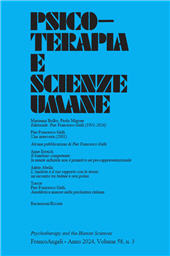L'analista e il suo rapporto con la teoria : un incontro tra balene e orsi polari
473-498 p.
Vengono poste due domande interconnesse. La prima riguarda il modo con cui ogni psicoanalista costruisce il proprio sistema teorico, e viene proposta l'idea che questa costruzione sia composta da tre elementi: il patrimonio teorico ricevuto; la propria personalità e la propria storia, sia personale che psicoanalitica; l'atmosfera socioculturale, cioè il tessuto di sensibilità, credenze, aspira-zioni e preoccupazioni specifiche dell'area geografica e del periodo storico. Il risultato è un edificio teorico molto personale, spesso eterogeneo, in gran parte inconscio e intriso di affetti. La se-conda domanda riguarda cosa succede quando si incontrano analisti con background teorici diversi. Un dettagliato caso clinico mostra la tensione tra teorie ufficiali e teorie private nell'analista nonché l'inevitabile presenza di un certo grado di non-comunicazione come invariante antropologica. [Testo dell'editore].
Two interconnected questions are discussed. The first question concerns the way in which each psychoanalyst constructs his or her own theoretical model, and it is suggested the idea that this construction is made of three elements: the theoretical heritage received; one's own personality and history, both personal and psychoanalytic; the socio-cultural atmosphere, i.e., the fabric of sensitivities, beliefs, aspirations and concerns specific to the geographical area and historical peri-od. The outcome is a very personal theoretical edifice, often heterogeneous, largely unconscious and imbued with affects. The second question is the following: what happens when analysts with different theoretical backgrounds meet? A detailed clinical case shows the tension between official theories and private theories among analyst as well as the irremediable presence of some degree of lack of communication as an anthropological invariant. [Publisher's Text].
Fait partie de
Psicoterapia e scienze umane : LVIII, 3, 2024-
Articles du même numéro (disponibles individuellement)
-
Informations
Code DOI : 10.3280/PU2024-003005
ISSN: 1972-5043
KEYWORDS
- Teoria psicoanalitica, Pluralismo, Dibattiti, Atmosfera socioculturale, Non-comunicazione
- Psychoanalytic theory, Pluralism, Debates, Sociocultural aspects, Non-communication


